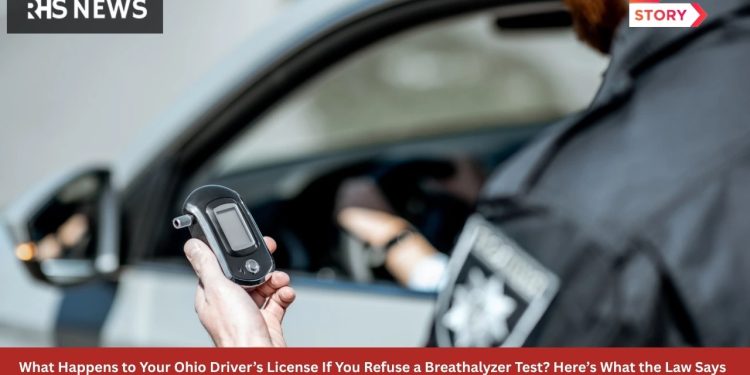Ohio – Driving through Ohio’s bustling cities—from Cleveland to Cincinnati, Columbus to Toledo—you have likely witnessed or even participated in a sobriety checkpoint or late-night traffic stop. Whether you’re a resident of Dayton driving home from work or a visitor passing through Akron, understanding the legal consequences of refusing a breathalyzer test in Ohio is crucial. The law doesn’t simply encourage compliance; it imposes serious administrative and criminal penalties for refusal that can dramatically affect your life, both immediately and in the long run.
Understanding Ohio’s Implied Consent Law
This Article Includes
- 1 Understanding Ohio’s Implied Consent Law
- 2 The Traffic Stop: Refusal at the Scene
- 3 Refusal After Arrest: Not Just a Simple “No”
- 4 How the Law Is Enforced: Due Process and Defenses
- 5 Breathalyzer Machines: The Role of Technology and Accuracy
- 6 Repeat Offenses: Compounding Consequences
- 7 Special Cases: Commercial Drivers and Out-of-State Residents
- 8 Myths and Misunderstandings
- 9 Choosing to Refuse: What Should You Do?
- 10 Conclusion
Ohio, like most states in the U.S., operates under an “implied consent” law. The principle is clear-cut: by obtaining and using a driver’s license, every driver in the state has already agreed to undergo chemical testing—be it breath, blood, or urine—if law enforcement has reasonable grounds to suspect driving under the influence (OVI/DUI). This applies on highways, city roads, and publically accessible property. The law is designed both to deter impaired driving and to facilitate swift, evidence-based prosecution.
The Traffic Stop: Refusal at the Scene
Picture this: you are stopped on I-71 near Grove City late on a Saturday night. The officer suspects you may be under the influence and asks you to step out and perform field sobriety tests—or perhaps requests a portable breath test. While you technically have the right to refuse these roadside field tests, the situation changes sharply after you are officially arrested for OVI. Once in custody, typically at a police station or medical facility, you will be formally asked to provide a breath, blood, or urine sample for chemical testing.
Refusal After Arrest: Not Just a Simple “No”
The moment you refuse a chemical test after being arrested, Ohio law springs into action. Whether in Youngstown or Springfield, the following sequence is nearly identical statewide.
Immediate License Suspension: Administrative License Suspension (ALS)
Refusal of the breathalyzer after arrest leads to an immediate, automatic suspension of your driver’s license. This is known as an Administrative License Suspension (ALS). The law does not wait for a court conviction or even for criminal charges. The officer will likely confiscate your license on the spot. For a first-time refusal, this suspension lasts for one year. For a second refusal within ten years, the penalty increases to two years; a third refusal pushes it to three years, and further refusals can extend suspension up to five years. These suspensions are in effect whether or not you are ultimately convicted for OVI.
Impact Across Ohio’s Diverse Communities
It doesn’t matter if you reside in Lima, work in Middletown, or attend college in Athens—the law applies equally. Losing your license can create enormous obstacles, especially in cities with limited public transit options. Commuting to downtown Cleveland, attending classes at Ohio State University in Columbus, or picking up your children in Findlay becomes a logistical headache.
Additional Criminal Penalties
Refusing a breathalyzer does not mean you avoid criminal charges. In fact, the refusal itself is a violation. Prosecutors in places like Hamilton or Newark regularly use your refusal as evidence in court—arguing that it demonstrates consciousness of guilt. Courts may issue harsher penalties upon conviction, such as increased jail time, longer license suspensions, mandatory DUI educational programs, and higher fines. In some counties, multiple refusals can even lead to mandatory ignition interlock devices, making even basic travel more burdensome.
Long-Term Legal Implications
A breathalyzer refusal becomes part of your permanent driving record. Employers in Sandusky or Chillicothe who require driving as part of job duties might question your reliability or judgment. If your job depends on a clean record—like commercial trucking through cities such as Dayton or Lorain—a refusal can end your career. Insurance premiums often jump substantially after either an OVI conviction or a refusal-related suspension. Some companies may decline coverage entirely, especially after multiple infractions.
Financial and Personal Burdens
License reinstatement is not as simple as waiting out the suspension. You will be required to pay reinstatement fees that can run into the hundreds of dollars, provide current proof of insurance (often SR-22, a costly “high-risk” policy), and in some cases, satisfy court-mandated requirements such as alcohol treatment courses. For parents in Newark or professionals commuting between Canton and Akron, the combined impact of lost wages, added transportation costs, and legal fees can be financially devastating.
Limited Driving Privileges: Is There Any Relief?
Ohio law does allow for a narrow set of exceptions during your suspension period. You may petition the court for “limited driving privileges,” sometimes referred to as occupational driving privileges. This allows restricted travel—to work, school, medical appointments, or court-ordered obligations—while your general license remains suspended. However, these privileges are at the discretion of judges and are not guaranteed. You may be denied if your offense is particularly severe or if you have prior refusals or OVI convictions.
How the Law Is Enforced: Due Process and Defenses
Law enforcement officers throughout cities like Westerville and Mason must follow strict procedures when requesting a breathalyzer test. The arresting officer is legally required to inform you of the consequences of refusal and provide a reasonable opportunity to comply. If you believe you were not properly informed, or if the officer lacked valid grounds for the traffic stop, you can request a hearing to challenge the suspension. Drivers have 30 days from the start of the suspension to contest it in court. Various defenses may be raised, such as miscommunication, medical inability to perform the test, or improper police procedure.
Breathalyzer Machines: The Role of Technology and Accuracy
In Ohio, the Intoxilyzer 8000 is the most common breath-testing device, used in cities like Cincinnati, Toledo, and Delaware. Like any machine, it is not infallible. Issues with calibration, environmental factors, and the individual’s physiology can sometimes produce inaccurate readings. Defense attorneys frequently examine whether the machine used was properly maintained and calibrated, as improper maintenance can result in thrown-out test results or even overturned convictions.
Repeat Offenses: Compounding Consequences
The first refusal carries stiff penalties, but multiple offenses dramatically exacerbate the situation. Imagine being stopped in Marion and refusing a second time within ten years. The minimum license suspension doubles, and additional court-ordered penalties can stack up. There are significant implications for any further criminal activity while under suspension, potentially leading to felony charges and even prison time. The law’s harsh escalation for repeat refusals underscores Ohio’s commitment to curbing drunk driving.
Special Cases: Commercial Drivers and Out-of-State Residents
For commercial drivers passing through Ohio—say, hauling goods from Cleveland to Springfield—the penalties are even harsher. Refusing a breathalyzer can trigger immediate disqualification from commercial driving for significant periods, costing jobs and livelihoods. Out-of-state drivers who refuse a test in Ohio will also find their home state notified of the refusal, often triggering reciprocal penalties there.
Myths and Misunderstandings
There’s a common misconception that refusing the breathalyzer test means you cannot be convicted of OVI. In reality, refusal can make the prosecution’s job easier, not harder. Your refusal provides the state with a narrative: a driver afraid to take the test is likely hiding impairment. While avoiding a high BAC reading, you do not avoid administrative penalties, and you risk harsher court judgments.
Choosing to Refuse: What Should You Do?
Every situation is unique, and there are times when refusing the test may be a reasonable strategic choice, especially if you believe your BAC is well over the legal limit. If you decline, contact a defense attorney in your area—whether you’re in Columbus, Youngstown, or mentor. An attorney may be able to challenge the arrest or the procedures followed by law enforcement, potentially reducing or eliminating the penalties.
Conclusion
Refusing a breathalyzer test in Ohio is a decision with immediate, long-lasting, and far-reaching consequences. While you have the right to refuse, the state’s implied consent law guarantees that you will face a swift and severe administrative license suspension—affecting your ability to work, travel, and live your life. Repeat refusals bring even harsher penalties, and prosecutors are equipped to use your refusal as evidence against you. From the skyline of Cincinnati to the college towns of Athens, the rules are clear, and the penalties are unavoidable. If you are ever in doubt about your rights or your legal standing after a refusal, it is crucial to contact a qualified attorney as soon as possible to guide you through Ohio’s complex legal landscape.









